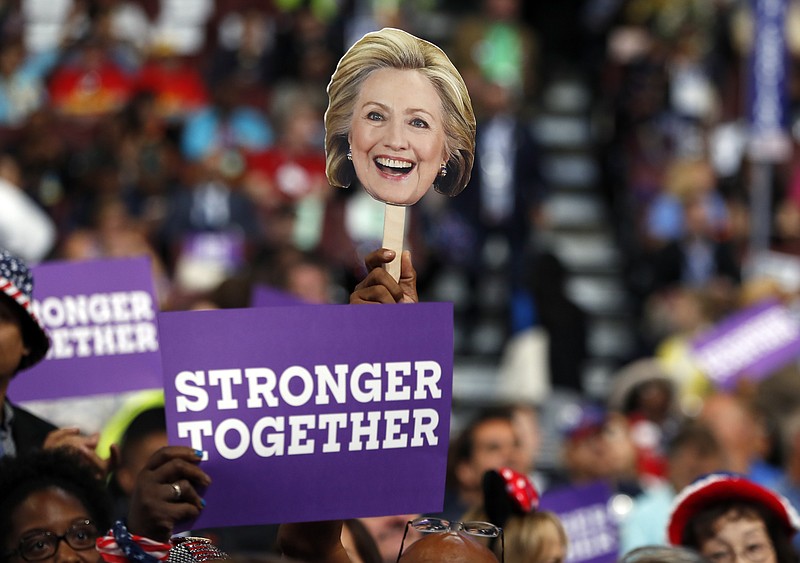Hillary Clinton made American history at the Democratic National Convention Thursday night, then offered America a warmed-over version of what it's had for the last seven years.
If leftovers are what the people want, and the last nearly two terms of Barack Obama have been to their liking, they'll elect her the first woman president of the United States. If not, they'll look elsewhere.
Clinton, the former first lady, back-bench senator and disastrous, one-term secretary of state, accepted the nomination of the Democratic Party that had worked behind the scenes to make her heir to the throne. Whether those who supported Sen. Bernie Sanders, against whom the party plotted in that divisive effort, join her may make a difference in the race.
The nominee, who, like Republican nominee Donald Trump, has one of the highest negative rates for any presidential candidate in measured history (68 percent, in a CNN poll, say she is not honest and trustworthy), had a daunting task in delivering her acceptance speech. She needed to present warmth (she admitted her public service has been more service than public); she needed to present herself as qualified (the Benghazi and email scandals had soured her reputation in her most recent office); and she needed to attack Republican candidate Donald Trump (his post-convention polling bump had put him ahead in opinion polls).
Of those three tasks, she accomplished the third more artfully than the first two. Of course, Clintons are always most effective when attacking.
She spun off some good lines for those on the fence about Trump, mocking him for saying "I alone can fix" the country, for Trump-related products not made in America, for saying he knows more than American generals and for his outlandish statements on women, Latinos and the disabled.
"A man you can bait with a tweet," Clinton said in her best line on the Republican, "is not a man you can trust with nuclear weapons."
Of course, then-President Jimmy Carter said something similar about Ronald Reagan in 1980, too. And Reagan, elected to two terms, turned out to be one of the biggest peacemakers of the second half of the 20th century.
Whether Clinton exuded warmth to those who watched her speech may not be known until November. She is not a strong public speaker, admittedly "sweats the details of policy" rather than how to sell it and said "some people don't know what to make of me."
Her daughter, Chelsea, attempted to soften her image in introducing her by describing her as a "wonderful, thoughtful, hilarious mother," but that's not the woman Americans have seen. Instead, they've seen the woman who callously asked "What difference at this point does it make?" how four U.S. diplomats were killed in Benghazi, Libya; who lied to the diplomats' families about the cause of their loved one's death; and who stonewalled and obfuscated about her use of an unsecured email server while secretary of state.
None of those instances, quite naturally, were referred to in Clinton's speech.
In her qualifications and accomplishments, she had little to reach for. She referred to research in helping children with disabilities attend school (a bill passed in the mid-1970s), to work supporting the Children's Health Insurance Program (a bill passed in the 1990s when her husband, Bill, was president) and to an investigation of the health of first responders (in the 9-11 terrorist attack in 2001).
Clinton did not mention the only three bills she sponsored in the Senate (one designating a historic site, one renaming a post office and one renaming a road) or anything - anything - about her tenure as secretary of state except for being in the room when President Obama made the decision to take out Osama bin Laden. She also said in passing that she visited 112 countries, but anybody with a passport and a credit card can do that.
In what she wants to accomplish, though, she had a boatload, mainly items from the far left agenda that President Obama couldn't get done and a few items that Sanders supported. If we just elect her, she said, we could pass a constitutional amendment to overturn the Supreme Court's Citizens United ruling about money in politics, pass the biggest "investment" in jobs since World War II, make college tuition free for the middle class and debt-free for all, reform the criminal justice system, defeat the Islamic State, create a path to citizenship for illegal immigrants, create millions of green energy jobs, pass a "living" minimum wage, expand Social Security and somehow force an "equal pay" law.
How will Clinton do all that? It's easy, she said. She'll make "Wall Street, corporations and the super rich start paying their share of taxes."
It's the same smoke and mirrors the American people have heard for the past seven and a half years.
Hillary Clinton will forever have a place in history as the first woman nominated for president by a major party, but, as Obama has shown, being "the first" this or that is neither a qualification nor an accomplishment.
Unfortunately, this "first" offers nothing more palatable than leftovers to an electorate so starved for leadership and strength.
